By Col Hellmuth
2027
“Are you certain that’s what you want, Sir?” prompts the Future Homes salesman.
“Our speciality is —”
“Retro. 1980s, authentic,” insists David. “You said your outfit could do it, right?”
“Sir, it’s just that —”
“You do have an office back in the ’80s, don’t you?” Dave jokes, “I mean, If there are any workmanship issues.”
“I’m sure you’ll have no issues with workmanship, David.
“May I call you David?”
David’s wife, better at reading character than he, senses something off in the salesman’s smile beyond its lack of humour; she adopts a mocking tone: “Twenty-one eighty, actually looks quite pleasant, David…” Julie points to the colour brochure with its ‘artist’s impressions’ in her hand, “and those little flying panic-rooms with the whirligigs on top are adorable!”
***
1987
In an uncharacteristic move, Julie gives in to David’s childish vision and Future Homes are engaged to realise it. Their promise to carry out the transformation overnight is literal. Neither David nor Julie hear the nocturnal trades persons, which is not only strange, it is impossible. The entire house has been renovated back to ’80s splendour as per David’s (unfortunately vague) specifications. Cognition comes via a bleary-eyed stumble down the non-existent stairs to the kitchen, from the missing second floor. He is late for work: his alarm clock has failed to go off as he failed to wind it. His boss will be furious.
Dave can’t remember where he works.
Davey says to his older sister, Janet: “Hey, what’s with this old clunker tee-vee set? There’s only three channels! And where’s the aych-dee-em-eye thingy? And the remote? And why is it big and boxy like a microwave?
“And where the fuck is my PlayStation?”
“Mum, where’s my tablet?” whines Janet.
“You’re too young to be needing pills, sweetie. You don’t have your Father’s hypertension, yet,” answers Julie, throwing Dave a wry smile and reaching over the dining table to flip the bread in the toaster, “and Davey, shut up.”
Julie is a little quicker in the mornings than her husband and has already caught on to the con. She hurriedly closes the kitchen drapes before the view outside arrests his attention further. “We’ve been gypped, Dear,” she explains patiently, “We didn’t hear any workmen because there weren’t any. There were no renovations.”
David continues to stare at her blankly, he hasn’t even noticed his son say ‘fuck’.
“It was too cheap and we fell for it. They were scammers, Dave. They just employed a garden-variety T--la Time-shift field on our house… and us, David!”
David isn’t sure he dislikes the ’80s so much. Cars sport more style — at least some do — and a variety of colours. There is less visual noise polluting the streets by day and the air tastes cleaner. After dark, in the commercial sector, the fuzzy, flickering quaintness of neon has yet to devolve into the over-bright, pretentious spectacle of LED and laser beams.
His outrage at finding his beloved home-built arcade gaming machine and fully functioning scale-model TARDIS gone in the renovation is somewhat tempered upon serendipitously witnessing the delivery of a new, original Double Dragon cabinet, the very one he’d played as a child, to his local fish-and-chip shop.
Dave doesn’t have a job, so he procures coins by stealing empty Coke bottles from out the back of the same establishment then collecting the deposit in a different neighbourhood—his mind is struggling to accept the time-shift; a burgeoning belief he’s the protagonist in a hack writer’s alternate-history story is impairing his moral judgement (besides, he’d gotten away with it as a kid). He is momentarily disoriented upon seeing his initials already in the high-score table before remembering they are shared with his son (Davey has already moved on to playing Nintendo for free at a mate’s house). Feeding a steady stream of 20c coins to the machine, David congratulates himself, unwarranted, on bettering the subscription-based gaming of his own time.
Dave finds the game repetitive and dull. Like he’s just traded an apple for the opportunity to whitewash a picket fence. At a tap on the shoulder, he turns around in annoyance, his concentration broken and coin forfeited.
“You’ve been stealing my empties.”
David goes home with a fat lip and his wife doesn’t nag him about playing ‘Space Invaders’ anymore. Davey returns from school the same day sporting two black eyes and a ‘please-explain’ letter addressed to Mr & Mrs David —, after attending costumed as a blue heeler and pissing on the wrong kid’s leg.
Julie finds the Future Homes contract in one of the kitchen drawers where the forks ought to be. She cannot fault the contractor’s quality of workmanship: it is exactly no better nor worse than the standards of the time. All obligations are fulfilled and the contract makes no reference in regard to superfluous redecoration of Earth and surrounds — it could be argued a no-cost bonus, anyway. The contract appears legally binding and so heavily contractor biased that Julie suspects it real. Despite the obvious problem of the document’s post-dating, husband and wife waste many hours learning to read legal jargon; then many more examining the contract in minute detail looking for a loop-hole, worm-hole, plot-hole… anything.
The charming simplicity of the 1980s belies a plethora of complications. One can’t rely on computers to carry out one’s thinking (or engage one in playful repartee with the “I am not a robot” game); nor robotics to undertake life’s distasteful chores (whilst feeling superior because they don’t have anything to prove) and it irks Julie that the natives simply write these tribulations off as inconvenient. Fortunately, the woman from another millennium has a less trivial matter to dwell upon: the technology that brought her family here is still considered science-fiction and derided as fantastic nonsense by the general public, in this decade.
Julie tries to picture herself on the cover of Amazing Stories as a scantily-clad Buck ‘Bikini’ Rogers, minus ray gun and stupid robot wing-man. Age is still mostly on her side rather than her bottom, and she is probably almost fit enough and easy enough on the indiscriminate teenage-male eye to pull it off. Unfortunately, she isn’t battling anything as benign as Bug-Eyed-Monsters or allegorical Cold Wars: she has to beat both the Universal Laws of Physics and Economics. What she really needs is the help of some exceptional and receptive minds (before they sell out), without whom she isn’t confident of guiding her family back to her own time. A perusal of the local library’s SF section — a single dusty shelf — fuels Julie’s cynicism and she reluctantly decides to forgo this pipe-dream to focus her energy elsewhere. She hasn’t quite got her head around paradoxes yet; her husband and son are no help at all and Janet has developed a neurosis about diverging timelines, manifesting as gruesome nightmares about butterflies — with her South-African pen-pal Elon’s head and genitals.
Of course, there is no Future Homes office “back in the ’80s.” Julie gets hold of a high-powered microscope and finds an escape clause in the small-print of the contract. The warranty promises to restore their home and contents (themselves included, she fantasises) back to original condition, on the proviso the customer is:
“... ‘... not completely satisfied … within seven days of contract signing …’ blah, blah, blah,” Julie finishes.
“‘Within seven days of …’ could be argued as seven days before,” offers David.
“Funny.”
“We can make it.”
His wife looks as doubtful as he. Both are secretly wondering if they are now their own grandparents and trying to do the mathematics in their heads.
***
-2027
David eventually comes to terms with being non-fictional and accepts that the world is mad and not he. He and his spouse find employment. He forges a successful, blessedly brief, career in Histrionics and writes several obtuse and obscure texts on the topic including his infamous critique of Orwell’s essay, Politics and the English Language (disseminating his contrary advocacy of cliché, catchphrase, word misappropriation and non-words briefly earns him the title ‘Influencer’); whilst Julie takes on secretarial and hospitality work to pay the bills and fill in the dull moments between domestic duties, muttering occasionally in her sleep about “… glass ceilings.”
They live healthy, frugal, highly mortgaged and only moderately dissatisfying lives that see them both through — much aged, yet relatively pain-free and in robust vigour, with an indefinite expiry date thanks to numerous expiring pharmaceutical patents and robotised surgery — to the year it all started.
2027-
Their house is no longer owned by the bank and looks almost the same as before the long anticipated ‘renovation’, excepting the kids’ rooms: the ‘kids’ having vacated in disgust decades ago to become respectable. One room now functions as the library and tea-room Julie always wanted, where she holds an Enid Blyton book club every Tuesday and entertains this clique in lieu of real friends; the other (sporting a well-stocked bar and secret desk-drawer full of white powder) is for whatever it is that Dave, now an honourable parliamentarian, does. Julie pretends not to notice that the clientele he entertains leave either wringing their hands or rubbing them together and wiping their noses, depending largely on the cut of their suit or weight of their briefcase. Her talent for self-deception is now almost as well honed as Dave’s.
Julie’s long-term plan has also seen the restoration of missing floors and modern appurtenances. Contemporary, is the new Retro. Decor and furnishings, now mass produced items, have resumed their original, vernal appearance — David and Julie have not. The couple’s early fears of missing the contract cooling-off period prove groundless. Society, as it stands, matches their (hazy) memories well enough and television advertisements for Future Homes are still proliferant, second in culpability only to the franchise the bulk of their household furniture originates from.
On the penultimate evening, the tiny second-floor verandah’s hardwood decking creaks intermittently to the rocking of David’s antique wooden chair, his one remaining nostalgic vice. David’s vision is focused on a point in the sky above the horizon, where he knows the evening stars ought to be. Julie reclines on an armchair dressed in ‘leather’ whose upholstery has never been worn by any self-respecting animal, an open lifestyle magazine neglected in her lap — taking in the literal, urban view (she now has a better understanding of paradoxes and lately has been dreaming about butterflies).
This twilight routine is long familiar to both. The unspoken tension — thicker than the fug — in the night air, is not. The calendar has also scared the moon from the sky or perhaps it is hiding behind light pollution; either way, the satellite’s cowardly absence offers no romantic nor mystic value to the anti-climatic atmosphere. Both David and Julie are feeling unexpectedly, uncomfortably, guiltily, content.
Conversation between the couple this evening has been sporadic, mildly derisive and carefully superficial. One, or the other, speaks now: the script is so derivative it makes little difference who begins.
“Did you understand any of our granddaughter’s last video-mail?”
“Not a word… nor a gesture.”
“Think it’s weird: she goes to the same school her grandmother did... and looks just like her in her school-yearbook photo, pose and all? … Could be cut and glued.”
“Cut and pasted.”
“Reckon she’s our only grandchild?”
“You been moonlighting?”
“Ha! Do you think the kids don’t remember our phone number... or where we live… because their minds have been secretly altered by a Chinese, alien-tech, space-ray on the moon?”
“Get a haircut.”
“Do you think they —”
“Could you leave off the pseudo post-existential conspiracy crap and talk like an adult just for once, David? The kids don’t visit because we’re dull. Maybe we could talk about that.”
“Actually, it’s contempor —
“Drink?”
“Is the Pope a camel, David?”
At some time during the night, Julie, still a little tipsy, stirs and totters downstairs to the kitchen, favouring her tricky hip. Following an odd compulsion she doesn’t bother to question, she takes the ancient (hours from new?) Future Homes contract, liberated earlier from Dave’s office, absently brushes off its dusting of powder and places it in the drawer where the forks ought to be.
![]()
About the Author
Col Hellmuth

Col Hellmuth is an ex-electrician/jack-of-all-trades (as in tired of them), who has retired to an off-grid lifestyle in Far North Queensland.
His latest obsession is building retro arcade gaming machines, the closest he’s come to fabricating a functioning time-machine— and more fun than home renovations...
![]()




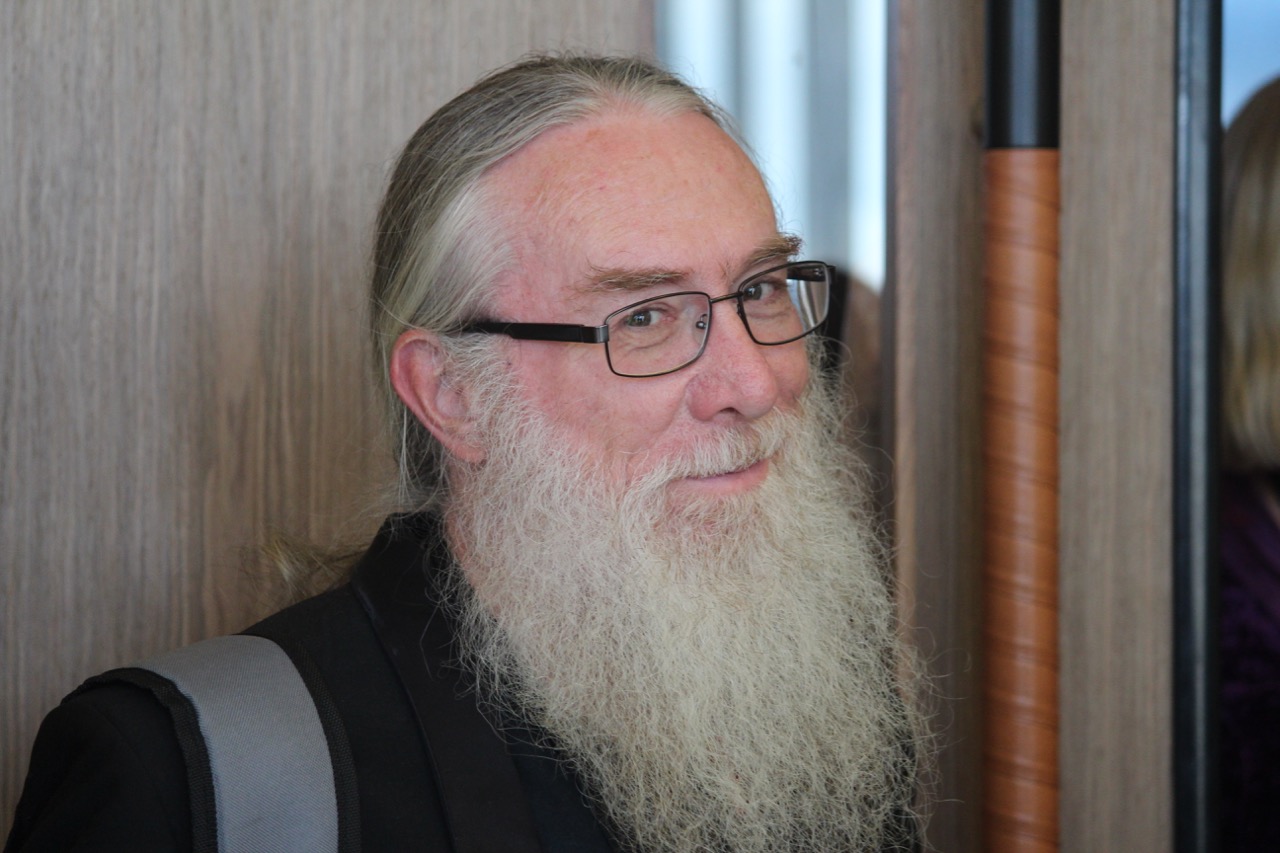





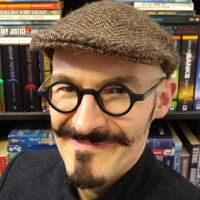





 Tara Campbell is an award-winning writer, teacher, Kimbilio Fellow, fiction co-editor at Barrelhouse, and graduate of American University's MFA in Creative Writing.
Tara Campbell is an award-winning writer, teacher, Kimbilio Fellow, fiction co-editor at Barrelhouse, and graduate of American University's MFA in Creative Writing. Chuck McKenzie was born in 1970, and still spends much of his time there.
Chuck McKenzie was born in 1970, and still spends much of his time there.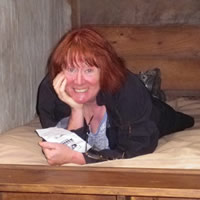 Margaret lives the good life on a small piece of rural New South Wales Australia, with an amazing man, a couple of pets, and several rambunctious wombats.
Margaret lives the good life on a small piece of rural New South Wales Australia, with an amazing man, a couple of pets, and several rambunctious wombats. Ed lives with his wife plus a magical assortment of native animals in tropical North Queensland.
Ed lives with his wife plus a magical assortment of native animals in tropical North Queensland.
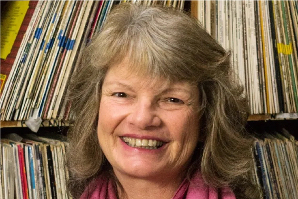 My time at Nambucca Valley Community Radio began back in 2016 after moving into the area from Sydney.
My time at Nambucca Valley Community Radio began back in 2016 after moving into the area from Sydney. Emma Louise Gill (she/her) is a British-Australian spec fic writer and consumer of vast amounts of coffee. Brought up on a diet of English lit, she rebelled and now spends her time writing explosive space opera and other fantastical things in
Emma Louise Gill (she/her) is a British-Australian spec fic writer and consumer of vast amounts of coffee. Brought up on a diet of English lit, she rebelled and now spends her time writing explosive space opera and other fantastical things in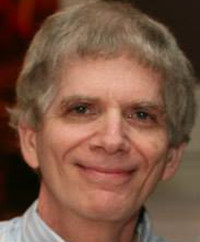 Barry Yedvobnick is a recently retired Biology Professor. He performed molecular biology and genetic research, and taught, at Emory University in Atlanta for 34 years. He is new to fiction writing, and enjoys taking real science a step or two beyond its known boundaries in his
Barry Yedvobnick is a recently retired Biology Professor. He performed molecular biology and genetic research, and taught, at Emory University in Atlanta for 34 years. He is new to fiction writing, and enjoys taking real science a step or two beyond its known boundaries in his Alistair Lloyd is a Melbourne based writer and narrator who has been consuming good quality science fiction and fantasy most of his life.
Alistair Lloyd is a Melbourne based writer and narrator who has been consuming good quality science fiction and fantasy most of his life.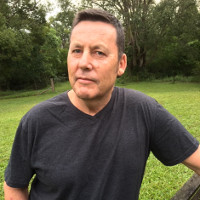 Tim Borella is an Australian author, mainly of short speculative fiction published in anthologies, online and in podcasts.
Tim Borella is an Australian author, mainly of short speculative fiction published in anthologies, online and in podcasts. Merri Andrew writes poetry and short fiction, some of which has appeared in Cordite, Be:longing, Baby Teeth and Islet, among other places.
Merri Andrew writes poetry and short fiction, some of which has appeared in Cordite, Be:longing, Baby Teeth and Islet, among other places. Geraldine Borella writes fiction for children, young adults and adults. Her work has been published by Deadset Press, IFWG Publishing, Wombat Books/Rhiza Edge, AHWA/Midnight Echo, Antipodean SF, Shacklebound Books, Black Ink Fiction, Paramour Ink Fiction, House of Loki and Raven & Drake
Geraldine Borella writes fiction for children, young adults and adults. Her work has been published by Deadset Press, IFWG Publishing, Wombat Books/Rhiza Edge, AHWA/Midnight Echo, Antipodean SF, Shacklebound Books, Black Ink Fiction, Paramour Ink Fiction, House of Loki and Raven & Drake Mark is an astrophysicist and space scientist who worked on the Cassini/Huygens mission to Saturn. Following this he worked in computer consultancy, engineering, and high energy research (with a stint at the JET Fusion Torus).
Mark is an astrophysicist and space scientist who worked on the Cassini/Huygens mission to Saturn. Following this he worked in computer consultancy, engineering, and high energy research (with a stint at the JET Fusion Torus). Sarah Jane Justice is an Adelaide-based fiction writer, poet, musician and spoken word artist.
Sarah Jane Justice is an Adelaide-based fiction writer, poet, musician and spoken word artist.